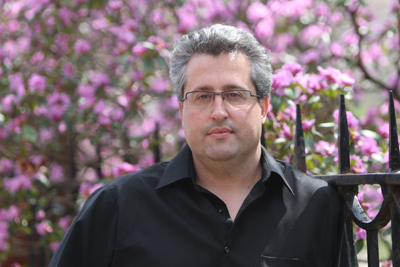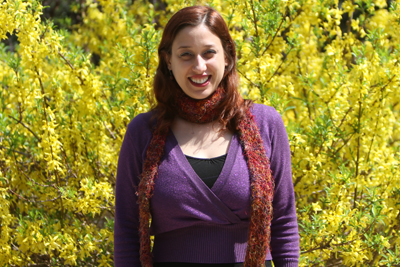Moisés Castillo can convince you that everything you’ve ever read circles back to Cervantes. As a new professor in the Hispanic Studies Department, Castillo doesn’t need to do too much convincing to get students to relate to an author who has been published only nearly as often as the Bible. “I can teach, through Cervantes, how all of these issues connect directly, expressly, in a very transparent way in today’s politics, today’s way of treating religious issues, ideology," he began. “It is amazing, and students say, ‘I should’ve taken Cervantes to understand Borges,’ because Borges was reading Cervantes. To understand Balzac, and the French, or James Joyce, every single great novelist today: you have to understand Cervantes.”
For the last several years, the department of Hispanic Studies has been without a professor specializing in Golden Age literature, and Castillo is enthusiastic about filling that space. Currently, he is advising two graduate students who have a vested interest in his areas of specialization. “The most exciting thing for me is to teach graduate students and to have this part of my research informed by what graduate students embark themselves in doing, and you have to embark with them, in the research.” Castillo is also excited about the possibility of sharing information about Granada and programs at the University of Granada with University of Kentucky students.
 As an undergraduate philosophy major at the University of Granada, Castillo focused his work on theoretical concepts, though literature was always in the foreground. Once in graduate school at the University of Minnesota, he began to more earnestly study literature through the lens of theory. “When I came to the University of Minnesota, I wasn’t sure if I was going to pursue literary studies or philosophy studies. My brother was also studying at the University of Minnesota, and he convinced me to connect philosophy, or theory, with literature, so that’s what I began to do.”
As an undergraduate philosophy major at the University of Granada, Castillo focused his work on theoretical concepts, though literature was always in the foreground. Once in graduate school at the University of Minnesota, he began to more earnestly study literature through the lens of theory. “When I came to the University of Minnesota, I wasn’t sure if I was going to pursue literary studies or philosophy studies. My brother was also studying at the University of Minnesota, and he convinced me to connect philosophy, or theory, with literature, so that’s what I began to do.”
For Castillo and his wife Carmen Moreno-Nuño, who will be joining the Hispanic Studies Department next fall, coming to Lexington was a welcome professional step. “For us, it has been 24 years: we did the BA in philosophy at Granada together, we did the PhD together, and for 10 years we worked half an hour apart—and now we will be back together at the University of Kentucky.” The couple began following similar academic paths in the field of Latin American Literature but at the University of Minnesota, “I thought that it would be good to diversify, and decided to focus on Golden Age and Colonial Literature, because my wife was inclined to contemporary Latin American and Peninsular Literature, and we went to extremes: I went to the Golden Age, and she went to the 20th and 21st Century Peninsular.”
Transitioning smoothly from 20th Century Latin American “Boom” Literature to Golden Age was not a large hurdle, because, according to Castillo, “Without Cervantes, there is no modern novel.”
--
For Mariana Amato, making the transition from Buenos Aires and New York City to Lexington, Kentucky was easier than expected. “Here you have many international students, which I appreciate particularly. And even beyond the university, in Lexington itself: it’s a very diverse city, it’s not homogeneous – if you walk around you hear people speaking many different languages.”
A native of Buenos Aires, Amato completed an undergraduate degree at the University of Buenos Aires, where she focused on literary theory. She then continued on to complete her PhD at New York University, broadening her area of specialty, “I went to NYU with the purpose of learning more. I had specialized in literary theory, and had a strong background in literature from Argentina, but I didn’t have a strong background in Latin American literature in general, so at NYU I wanted to expand my knowledge in the area. Studying in New York City also gave me the opportunity to work with people who came from all over Latin America, students and professors, or who were from the US and had specialized in other areas of Latin America: The whole experience helped me to have a broader map.”
For Amato, Latin American literature is a conduit through which the political may be explored. Amato has a keen interest in biopolitics and modern Latin American literature, particularly of the Southern Cone region. Though Amato began her studies with a focus on the late 19th Century and early 20th Century, her current research has led her into the late 20th Century as well.
Amato’s dissertation explored images of the animal and the human in the early manifestations of fantastic literature in Argentina. “The narratives of Eduardo Holmberg, Leopoldo Lugones and Horacio Quiroga absorb the new questions that had arisen in the natural sciences at the end of the nineteenth century, and translate them into inquiries about the political. I particularly observe this permutation in a series of figures that probe the limits between the animal and the human, the organic and the monstrous, the spontaneous and the automatic, life and death. Such is the case with the beasts, automata, ghosts, spirits and forces that populate these texts.” Amato’s current manuscript will expand her dissertation research into an exploration of images of the animal and the flesh in 20th century Latin American literature.
This semester, Amato’s courses at UK aim to show students the various links between the political and the literary within Latin American writing and to lead them in new theoretical directions. “I wanted to show students how Latin American literature has been interested in the political, and how the literary and the political relate in Latin American culture.”
 In addition to serving as a specialist on Latin American literature, Amato looks forward to acting as a resource on her home city, a cosmopolitan center in Latin America. "Many students have asked me about traveling to Buenos Aires, and I always encourage them. It can be a very good experience for students who want to learn more Spanish, and if they want to learn more about one specific Latin American culture. And it’s one of the places I can give them a great deal of information about. I give them advice in terms of what they can expect about the city.”
In addition to serving as a specialist on Latin American literature, Amato looks forward to acting as a resource on her home city, a cosmopolitan center in Latin America. "Many students have asked me about traveling to Buenos Aires, and I always encourage them. It can be a very good experience for students who want to learn more Spanish, and if they want to learn more about one specific Latin American culture. And it’s one of the places I can give them a great deal of information about. I give them advice in terms of what they can expect about the city.”
Amato’s students at UK are also proving to be a strong source of knowledge, and have illuminated her own studies. Working with both undergraduate and graduate students means that, aside from completing one’s own research, “you’re able to ask different questions, have a different dialogue, read research projects, which is very stimulating.” Though Amato is deeply interested in literary theory, she looks forward to students bringing their own interests to her courses, to begin tracing their own cartographies of Latin American literature.
“That’s the value of literary analysis—that you discover things about what you read that you perhaps hadn’t seen or thought about initially, but when you discuss a text something of the meaning opens up and becomes multiple or enfolds. That is a very rewarding moment in the classroom.”
by Hannah LeGris
photos by Cary Tsamas
